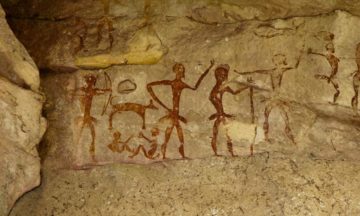Andrew Anthony in The Guardian:
 In the wake of bestselling blockbusters such as Jared Diamond’s Collapse and Yuval Noah Harari’s Sapiens, that backwater of history – prehistory – has been infused by a surge of popular interest. It’s also proved an area of fertile promise for those who find the established narratives of modernity either constricting or based on false premises or both.
In the wake of bestselling blockbusters such as Jared Diamond’s Collapse and Yuval Noah Harari’s Sapiens, that backwater of history – prehistory – has been infused by a surge of popular interest. It’s also proved an area of fertile promise for those who find the established narratives of modernity either constricting or based on false premises or both.
The last point is particularly relevant for the egalitarian-minded. After the catastrophic failure of the Soviet experiment, there were few places left to turn in support of the belief that humanity is at heart cooperative rather than competitive. The notable exception was the pre-agricultural era, those tens of thousands of years in which humans were thought to live in a state of… well, what exactly?
Since the Enlightenment, there have been two conflicting visions of humanity stripped of its civilised trappings. On the one hand, there is Hobbes’s notion of us as predisposed to violence – waging war against each other in a “nasty, brutish and short” existence. On the other, Rousseau’s idyll of prelapsarian innocence, in which humanity led a life of Edenic bliss before being destroyed by the corruptions of society.
Both these understandings of humanity’s roots are manifestly wrong, contend the late anthropologist David Graeber and his co-author, the archaeologist David Wengrow in their new and richly provocative book, The Dawn of Everything: A New History of Humanity. As the title suggests, this is a boldly ambitious work that seems intent to attack received wisdoms and myths on almost every one of its nearly 700 absorbing pages.
More here.
